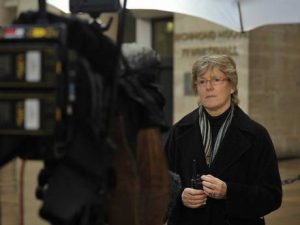Call for free vitamins for children
England’s chief medical officer has said all children should be offered vitamin supplements to safeguard their health.
Currently the NHS offers free vitamins A, C and D to all children under five from low-income families.
It has been claimed up to 25% of children are vitamin D deficient, leading to a rise in rickets cases.
In her annual report, Prof Dame Sally Davies says extending the scheme would protect more children and save money.
But she warned people should feel “profoundly ashamed” of what she says is a “very worrying picture” of children’s health.
And she said the UK lags behind many other European countries.
‘Not just about poverty’
Under the current scheme, children aged six months to four years are eligible for free vitamins if their parents are on benefits.
But Dame Sally said more needed to be done to give children a good start with their health, and acting early would save taxpayers’ money.
She has asked the medicines watchdog, the National Institute for Health and Clinical Excellence (NICE), to examine the cost-effectiveness of offering vitamins A, C and D to all children under five.
Dame Sally told BBC Radio 4’s Today programme “Vitamin D deficiency is not just about poverty”.
She said children with developmental issues due to being born prematurely, those from ethnic minorities as well as children being “covered up” to protect them from the sun thereby missing out on the benefits too,
She added: “Children get very locked on to screens and it can be difficult to turf them out into the sunlight. But the sun in the winter doesn’t give you as much vitamin D so this is necessary.”
“This would cost pennies a day and would undoubtedly save money in the long run.”
She said the giving parents vitamins for their children would “empower” them, giving them an extra boost during the winter months when there is less sunlight.
‘Absolutely shocking’
In her report, Dame Sally also called for more research into mental health problems in adolescents.
She is calling for a survey of young people’s mental health, amid concerns about funding and services.
Only 25% of children with clinical mental health disorders receive specialist help within three years.
Dame Sally said her annual report – which this year is on child health – questioned whether our society had got the balance right and should act as a wake-up call.
She said obesity stood out as one of the big issues, but the report also demonstrated the interplay between health, social environment, emotional environment and education.
Some of the statistics, such as five more children aged up to 14 years dying each day of avoidable causes than in Sweden, were “absolutely shocking”, she said.
Dame Sally told BBC Radio 5 live: “The majority of deaths are in the first year of life, and these relate to prematurity.”
She said premature births could be reduced by stopping smoking during pregnancy and by improving the health and diet of pregnant women.
The chief medical officer’s annual report also calls for:
- a named GP for every child with long-term conditions
- a new national children’s week to celebrate children and young people
- a regular survey on mental health among children and young people, including comparisons with other developed countries, to improve the evidence base for meeting young people’s mental health needs.
National Children’s Bureau chief executive Dr Hilary Emery said: “The UK must have greater expectations for children’s health if we are to be the best place in the world for children to grow up.
“As a nation we must be much more ambitious about giving every child the best start in life, and this should be a priority for all decision makers in central and local government.”
The report is entitled – Our Children Deserve Better, Prevention Pays.
